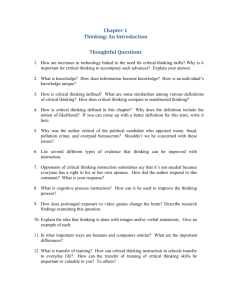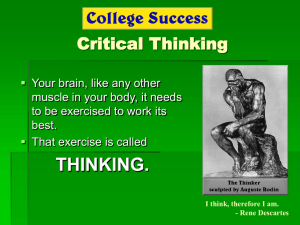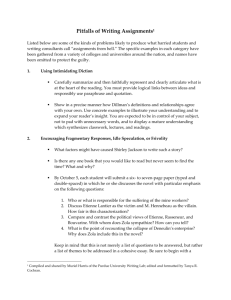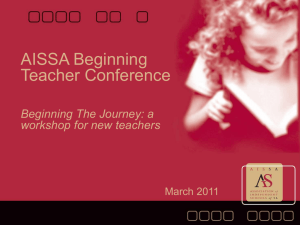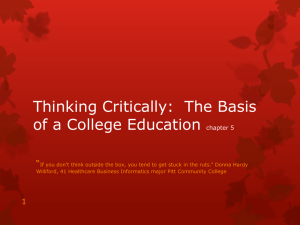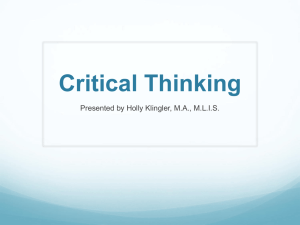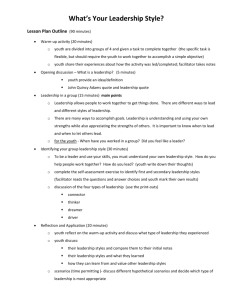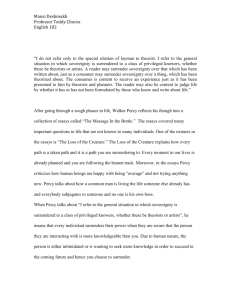economic thinkers - Economics Learning Standards
advertisement
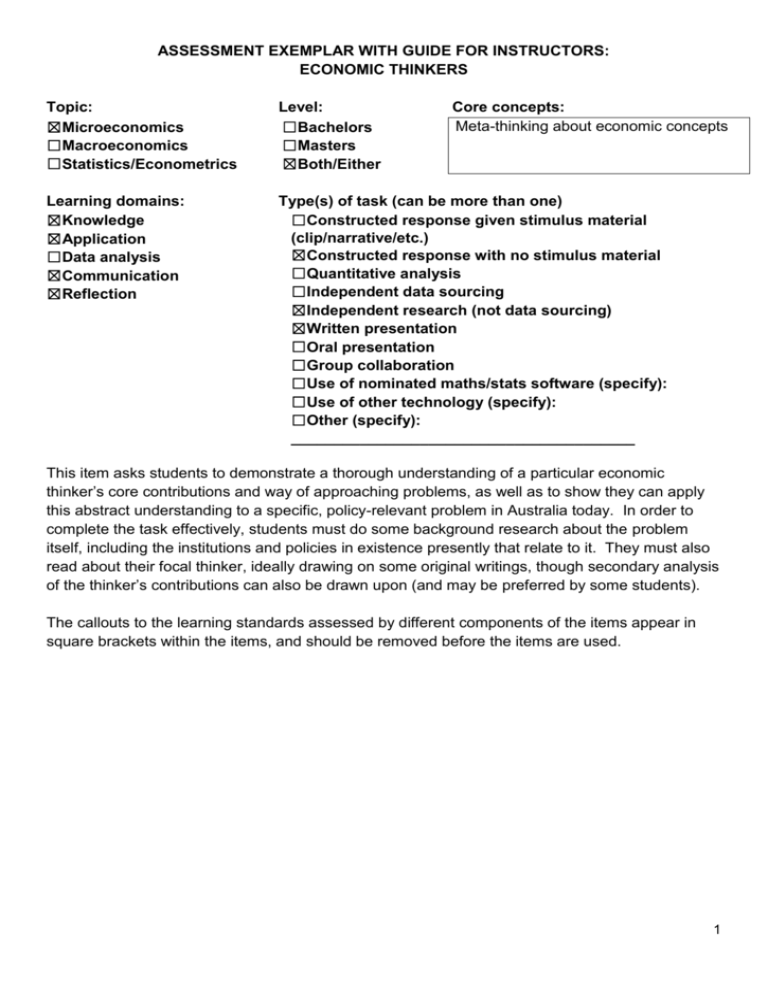
ASSESSMENT EXEMPLAR WITH GUIDE FOR INSTRUCTORS:
ECONOMIC THINKERS
Topic:
☒Microeconomics
☐Macroeconomics
☐Statistics/Econometrics
Level:
☐Bachelors
☐Masters
☒Both/Either
Core concepts:
Meta-thinking about economic concepts
Learning domains:
☒Knowledge
☒Application
☐Data analysis
☒Communication
☒Reflection
Type(s) of task (can be more than one)
☐Constructed response given stimulus material
(clip/narrative/etc.)
☒Constructed response with no stimulus material
☐Quantitative analysis
☐Independent data sourcing
☒Independent research (not data sourcing)
☒Written presentation
☐Oral presentation
☐Group collaboration
☐Use of nominated maths/stats software (specify):
☐Use of other technology (specify):
☐Other (specify):
________________________________________
This item asks students to demonstrate a thorough understanding of a particular economic
thinker’s core contributions and way of approaching problems, as well as to show they can apply
this abstract understanding to a specific, policy-relevant problem in Australia today. In order to
complete the task effectively, students must do some background research about the problem
itself, including the institutions and policies in existence presently that relate to it. They must also
read about their focal thinker, ideally drawing on some original writings, though secondary analysis
of the thinker’s contributions can also be drawn upon (and may be preferred by some students).
The callouts to the learning standards assessed by different components of the items appear in
square brackets within the items, and should be removed before the items are used.
1
Bachelors level task:
In this assignment, you will apply the conceptual frame of one economic thinker to the problem of
income inequality. What policies should Australia adopt to combat income inequality? What
institutions (if any) should be constructed to manage this problem, and why?
The first step is to select a focal economic thinker. The list of thinkers from which you may choose
one is provided here: {list of thinkers}.
You should start by clarifying in your own mind the core elements of the perspective taken by your
focal thinker. What quantities, processes, and causal dependencies did he particularly focus on,
and why? What concrete events in his own life gave rise to or influenced his thinking? You may
wish to conduct some additional research into his life, times, and thoughts, to enhance your
understanding.
Then, think carefully about the concrete problem of income inequality, doing some background
research about the problem if you feel it necessary. What parallels or contrasts exist between this
problem and the events experienced by your focal thinker, and how does the problem map into his
perspective on the world? Finally, think about how to successfully convey your developed
thoughts to an intellectual audience that is broadly aware of the issue, but unfamiliar with your
focal thinker. Think first; write only after you have thought.
You should write between 3 and 5 pages, of which about one-third should explain in broad strokes
the perspective of your focal thinker, and two-thirds should present your analysis of how that
thinker would have viewed the concrete problem of income inequality. [CB1] What are the core
quantities, processes, and causal dependencies relevant to this problem that he would have
highlighted? [KB1,AB1] What solutions might he have offered, and why? [AB2,RB1,RB2,RB3] If
you feel that your focal thinker would not have concerned himself with this issue or would not have
considered it important, thoroughly explain why.
2
Masters level task:
In this assignment, you will apply the conceptual frame of one economic thinker to the problem of
income inequality. What policies should Australia adopt to combat income inequality? What
institutions (if any) should be constructed to manage this problem, and why?
The first step is to select a focal economic thinker. The list of thinkers from which you may choose
one is provided here: {list of thinkers}.
You should start by clarifying in your own mind the core elements of the perspective taken by your
focal thinker. What quantities, processes, and causal dependencies did he particularly focus on,
and why? What concrete events in his own life gave rise to or influenced his thinking? You may
wish to conduct some additional research into his life, times, and thoughts, to enhance your
understanding.
Then, think carefully about the concrete problem of income inequality, doing some background
research about the problem if you feel it necessary. What parallels or contrasts exist between this
problem and the events experienced by your focal thinker, and how does the problem map into his
perspective on the world? Finally, think about how to successfully convey your developed
thoughts to an intellectual audience that is broadly aware of the issue, but unfamiliar with your
focal thinker. Think first; write only after you have thought.
You should write between 3 and 5 pages, of which about one-third should explain in broad strokes
the perspective of your focal thinker, and two-thirds should present your analysis of how that
thinker would have viewed the concrete problem of income inequality. [CM1] What are the core
quantities, processes, and causal dependencies relevant to this problem that he would have
highlighted? [KM1,AM1,AM2] What solutions might he have offered, and why?
[AM2,RM1,RM2,RM3] If you feel that your focal thinker would not have concerned himself with this
issue or would not have considered it important, thoroughly explain why.
As a supplement to your analysis, provide a half-page reflection on the relevance of your thinker’s
contributions to the discussion and implementation of economic policy in modern Australia. [RM2,
RM3,CM1]
3
Advice to assessors
This item pre-supposes that the doctrines of various economic thinkers have been explored
already in the course to at least some extent. The list of thinkers is up to the instructor, but might
include people such as Adam Smith, Thomas Malthus, David Ricardo, Robert Owen, Henri de
Saint-Simon, John Stuart Mill, Karl Marx, Francis Edgeworth, Henry George, Thornstein Veblen,
John Maynard Keynes, or Friedrich Hayek.
The type of communication used can be written, which is the default, but could also be oral.
Masters students could use their analysis as the basis for a debate about Australian policy,
possibly incorporating a collaborative component if debate preparation occurs within teams, or a
role-playing game where different students play the role of The Economist, The Head of Ministry
X, The Lobby Representative for Industry Y, and so on. Other than that, the main difference
between the Bachelors and Masters version of this question is in the quality (both depth and
breadth of engagement, and degree of reflection) of the responses one should expect.
The question frame can be used as a graft for other questions that query students’ skills in
evaluating the relevance of historical economic thinkers to modern policy-relevant Australian
problems – for example, a discussion of how a given thinker’s frameworks are relevant to the
problems of immigration/boat people, the seduction of young men into lives of terrorism, the
corruption displayed by powerful groups in society, or other modern problems.
4
Learning
domain
Learning outcomes
Bachelor Degree
Masters Degree
Knowledge
KB1 Bachelor graduates will be able to
identify, coherently explain and synthesise
core economic concepts
KM1 Masters graduates will be able to
identify, coherently explain and synthesise
core and advanced economic concepts,
including recent developments in the
discipline
Application
Bachelor graduates will be able to:
Masters graduates will be able to:
AB1• frame problems in terms of core
economic concepts and principles
AM1• frame and critically analyse problems in
terms of core and advanced economic
concepts and principles
AB2• apply economic reasoning and
analytical skills, in order to make informed
judgments and decisions
AM2• apply advanced economic reasoning
and analytical skills, including quantitative
techniques where appropriate, in order to
make informed judgments and decisions
AM3• plan and execute a research-based
project
Data analysis
Bachelor graduates will be:
Masters graduates will be able to:
DB1• able to use economic data to address
typical problems faced by economists
DM1• select and apply an appropriate
empirical method to address typical problems
faced by economists
DB2• aware of, and able to implement,
basic empirical techniques and interpret the
results
DM2• critically evaluate the results
Communication CB1 Bachelor graduates will be able to
present a clear and coherent exposition of
economic knowledge, ideas and empirical
evidence both orally and in writing,
individually or in collaborative contexts
CM1 Masters graduates will be able to
communicate complex ideas clearly and
coherently, in written form and interactive oral
form to expert and non-expert audiences,
individually or in collaborative contexts
Reflection
Bachelor graduates will be able to reflect
on:
Masters graduates will be able to reflect on
and evaluate:
RB1• the nature and implications of
assumptions and value judgments in
economic analysis and policy
RM1• the nature and implications of
assumptions and value judgments in
economic analysis and policy
RB2• interactions between economic
thinking and economic events, both
historical and contemporary
RM2• interactions between economic thinking
and economic events, both historical and
contemporary
RB3• the responsibilities of economists and
their role in society
RM3• the responsibilities of economists and
their role in society
5
